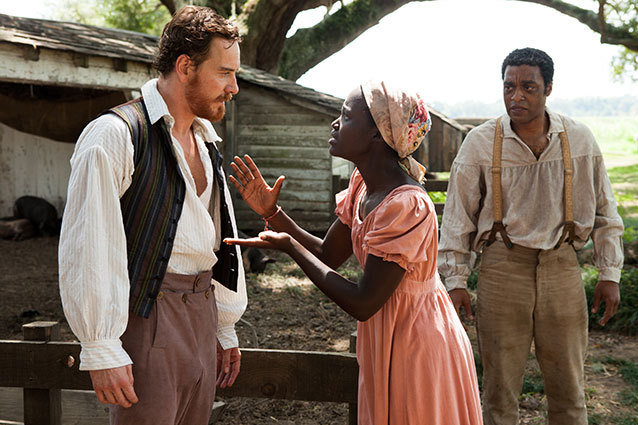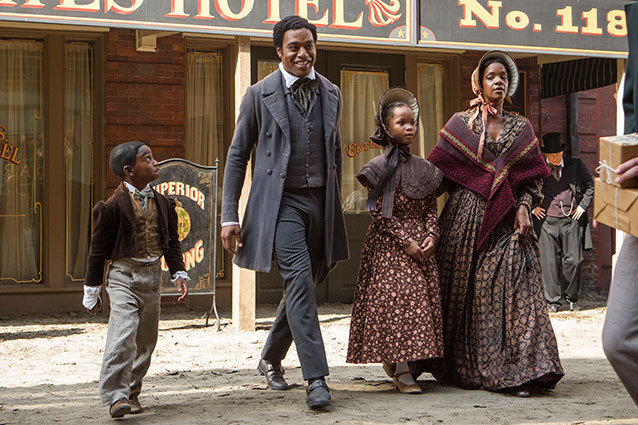
At the center of 12 Years a Slave is Solomon Northrup, whose story will likely be sold to you — by those boasting of this movie’s power — as the pinnacle of human tragedy. A free black man living in New York during the first half of the 19th century, Northrup is kidnapped, taken from his wife and children, transported below the Mason-Dixon line, and sold into slavery. Where he remains for the following 12 years. Intelligent, compassionate, sophisticated, and ostensibly closer in upbringing and psychology to any of us watching the feature than the lifelong slaves we’ll meet along the way, we’re suggested to identify immediately with Chiwetel Ejiofor’s lead character, to assign our heightened sympathies to his new sweep of tragedy, to feel that what happened to Solomon is beyond the traditional horrors of this dark period of American history. But Solomon’s familiarity doesn’t serve to separate him from the rest of the men and women robbed of their lives and humanity in 12 Years a Slave, but instead to escort us right into the midst of this universal nightmare. It places us among the enslaved souls — it’s not just in body that they are prisoners — more effectively than any other film that has attempted to emanate these themes.
Spanning Solomon’s decade of enslavement with domineering patience, the movie is able to make everything in this corrosive old world so vivid. Hurdling between hope and hopelessness, survivalism and principle, Solomon (called “Pratt” by his slaveowners and fellow workers) struggles to figure out how to make it not only through but past his plantation days and return to his family. It is a mission that never quite reaches impossibility to him as the time crawls on, as he is dealt the sort of tragedies the man he once was — a violinist, community fixture, and father of two — seemed happy to refrain from imagining, while men and women miles to the south of him were living within them.
 Fox Searchlight
Fox Searchlight
This will that we never see quite fade from Solomon’s eyes comes from his having something very real to hope for, to live for. It is, more than the characteristics with which we can comfortably identify, what makes him 12 Years a Slave‘s hero. But as piercingly sad as Solomon’s story is, his is not the most tragic. Through Solomon — who is not only an effectual confidant to us but to many other characters in the film as well, slaves and slaveowners alike — we are invited into a world entirely barren of his sort of drive: the heart of fellow slave Patsey (Lupita Nyong’o), a dutiful young woman and the target of her master’s (Michael Fassbender) unrelenting lust. In Solomon’s story, we cry over the idea of him never returning home to his family. Of him incurring tortures so malignant as to eviscerate the very man he was at the beginning of our time with him. In the story of Patsey, with whom we spend quite a good deal of time once she is introduced upon Solomon’s transport to Edwin Epps’ (Fassbender) plantation, we cry because there is hardly any spirit left to destroy. And trust me, the crying is inevitable.
In a film filled with scenes of physical torment so mortifying that they’ll promise to rob you of breath and a settled stomach, it is a testament to director Steve McQueen and his cast that the elements that truly stay with you are the internal horrors. Young Patsey’s destitute heart. Even the pangs of Epps, starved for any semblance of self-worth as he claws at the souls of himself and every living being around him. There’s nary a corner of this film that is not drenched in the bottomless sorrow intrinsic of the era. The very fabric of 12 Years a Slave is hopelessness.
And at the center of that is Solomon — the river of hope coursing through this broken terrain. Although we’ll face his narrative with reflexive gasps, it is his story to which we align because we can see hope in it. Something to fight for, something to live for. It is because of Solomon, because of Ejiofor’s masterful depiction of the real-life man and because of McQueen’s enforcement of his unbelievable story, that we are able to stomach the thought of entering this horrible, miserable world. And that’s a good thing. Because once we’re in there, we see these horrors, these miseries in a form that we aren’t likely to have seen them before. Yes, we’ve all been enlightened unto the depletive hell that was the era of American slavery. But perhaps never, at least through cinema, have we been placed so vividly among the human beings who suffered through it.
5/5


